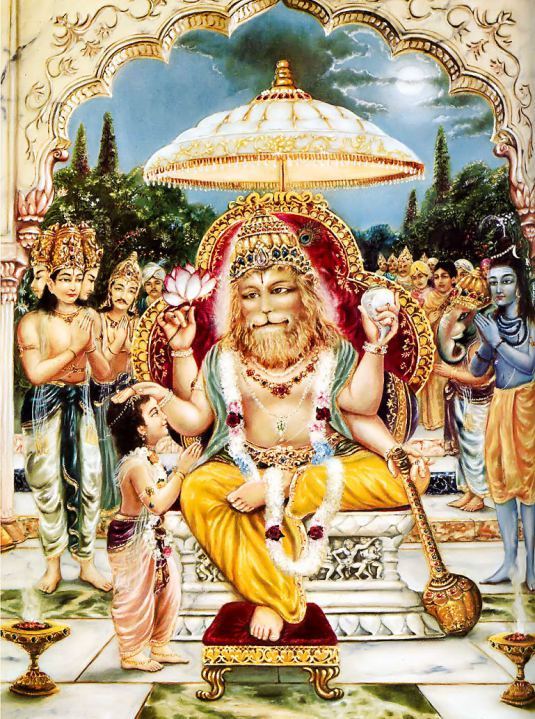Question: In Hindu culture, in all pujas we used to pray first for Ganesa but we are not following this. Why?
Answer by Romapada Swami:
According to Vedic tradition, ceremonial rituals were generally begun by worshiping the demigod Ganesa; the reason for doing so is the fact that Ganapati drives away all impediments in the execution of such rituals. In the Brahma Samhita, prayers by Lord Brahma, it is stated that Ganesa worships the lotus feet of Lord Narasimhadev and has thus become a source of great auspiciousness and is able to clear all impediments. (Text 50)
Vaishnava scriptures and our acaryas at times indicate the worship of Ganesa in the execution of specific vaisnava tantras or rituals, although it is not a mandatory principle. Perhaps you have read in Bhagavad-gita about the differences between worshiping demigods and worshiping the Supreme Personality of Godhead. These distinctions are nicely explained in Bg. 7.20–23, 9.23+25 and 4.12). Krishna describes ritualistic or materially motivated worship of demigods, without proper understanding of their position in relation to Krishna, as improper and less intelligent.
But if this difference is properly understood, as well as one bears in mind the proper motive for approaching the demigod, viz. enhancing devotion for Krishna and NOT advancing one’s material well-being or prosperity, then it is not incorrect to offer one’s respect and worship demigods. Worship of Krishna, the source of all demigods, however, is sufficient and complete in itself, just as by watering the roots of a tree one automatically nourishes all parts of the tree.
Srila Rupa Goswami mentions the worship of Ganesa in his Bhakti-rasamrta Sindhu (see Nectar of Devotion Chapter 8, pg. 71). Srila Prabhupada, however, did not encourage his disciples to take up such worship, stating that it was not practically necessary and could potentially prove to be a distraction, since one’s aspirations are not only for attaining pure devotion, in the beginning stages of sadhana bhakti. Instead, seeking the mercy of Sri Caitanya Mahaprabhu and worshiping Lord Narasimhadeva were what he instituted as our means to remove all obstacles and inauspiciousness in our devotional life.
Although there are many principles in the scriptures, the essential principles applicable to a particular time, place and circumstances are selected and indicated by our immediate acaryas. Knowing the difficulties of the age of Kali, where our lives are very short and disturbed, and there being so many opportunities to be deviated from the pure knowledge and practice of Krishna consciousness, Srila Prabhupada placed emphasis on simply focusing our attention without any diversion on the primary processes of bhakti which are sravanam kirtanam visnu smaranam (hearing, chanting, remembering etc. about Vishnu).
Question: 298) In our study group we are doing Narasimha Arati after Bhagavad-gita session. Is there anything wrong in this order?
Answer by Romapada Swami: No, there is nothing wrong. We worship Lord Narasimhadeva as the destroyer of all obstacles and difficulties in the path of devotion, as I indicated in the previous answer. Lord Narasimha is famous as the protector of His devotee. Generally, we sing the Narasimha arati prayers at the end of Deity worship, morning and evening arati or sankirtana, so that all our offenses and shortcomings in the endeavor we made to worship the Lord are vanquished.







